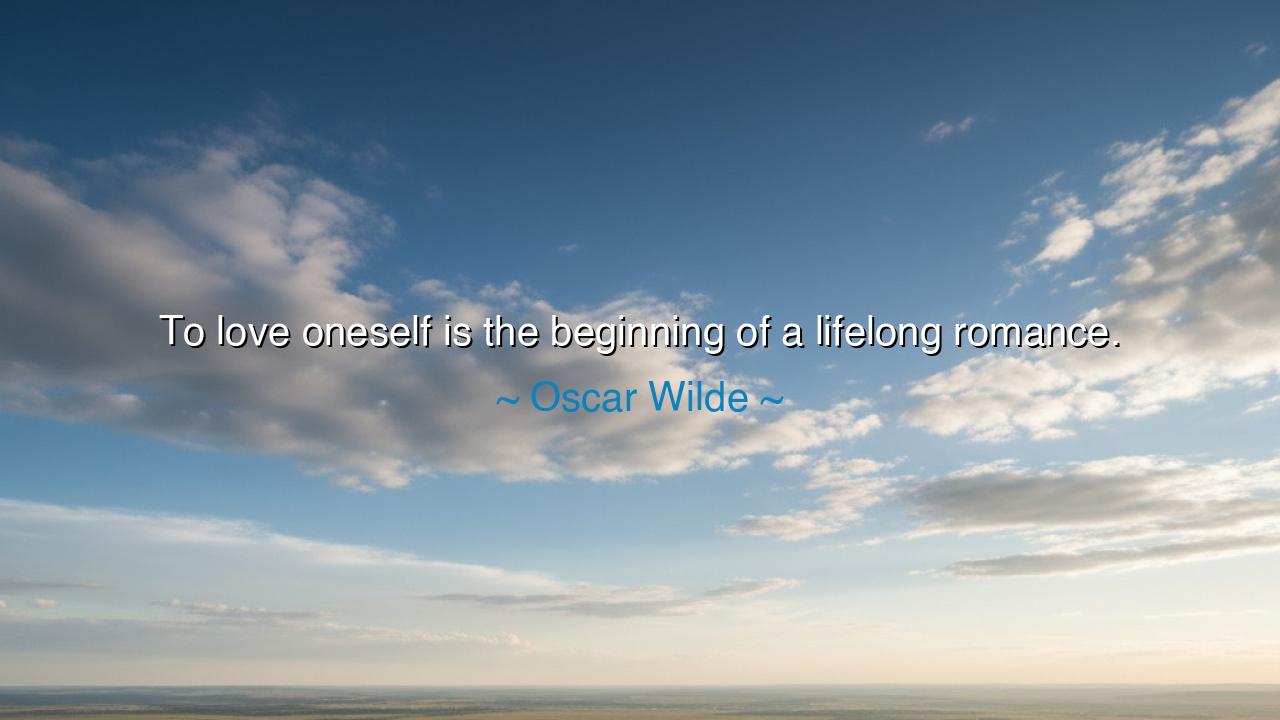
To love oneself is the beginning of a lifelong romance.






"To love oneself is the beginning of a lifelong romance." These words from Oscar Wilde resonate deeply with the ancient wisdom that teaches us to look inward before we seek outward connections. Love begins within, and until we learn to embrace ourselves fully, to understand our own worth and value, the love we offer to others will always be incomplete. This love for the self is not arrogance, nor is it selfishness; it is a recognition of one's own intrinsic value, a sacred understanding that we are worthy of the same love and respect we so freely give to others. Wilde’s words remind us that true happiness, peace, and fulfillment are born from a deep and abiding love for ourselves, a romance that lasts a lifetime.
O children of the earth, hear this: love is not something that is only given to others; it must first be cultivated within. To love oneself is the foundation upon which all other relationships are built. Self-love is not an indulgence, but a necessary act of self-care, of recognizing one's own humanity, imperfections, and potential. Just as the greatest romance stories are born from the meeting of two souls who deeply respect and adore one another, so too must we meet ourselves with the same admiration. Only then can we offer the fullness of our hearts to those around us. It is in the embrace of self-love that we begin the most important and enduring relationship of our lives—the one with our own soul.
Consider the example of Leonardo da Vinci, whose relationship with himself was one of constant growth, reflection, and deep respect. He did not merely create out of a need to please others; he created because he was in constant dialogue with his own thoughts, his own curiosity, and his own desires. Da Vinci’s self-love was reflected in the care with which he approached his art and his studies. He was deeply devoted to understanding himself, to nurturing his genius, and in doing so, he was able to offer the world some of the most enduring works of art and science. His romance with himself allowed him to express his vision without fear of judgment, and in that freedom, he changed the world. Da Vinci’s love for his own potential enabled him to leave a legacy that still endures today.
Similarly, the great Ralph Waldo Emerson spoke often of self-reliance, encouraging others to trust in their own inner voice and judgment. Emerson’s love for himself was rooted in his belief in the power of individuality and self-expression. He understood that to truly contribute to the world, one must first be rooted in self-love and trust. He did not seek validation from others but cultivated a life of romance with his own thoughts and values. His writings, his life, were a testament to the fact that love of self is the bedrock of a life well-lived. To love oneself is to be grounded, to have the strength to stand on one’s own without relying on the opinions of others.
But what does it mean to love oneself? It is not to ignore the faults or weaknesses that we carry as human beings, but to accept them, to understand that they are part of what makes us whole. Self-love involves nurturing our inner peace, forgiving ourselves for past mistakes, and allowing room for growth. It is an act of patience and grace, the recognition that we are worthy of the very love and care we so often give to others. Self-love is not about perfection, but about honoring the journey of being human, the beauty in our flaws, and the potential that lies within us all. It is this kind of love that allows us to move through the world with confidence and generosity, for we no longer seek validation from the outside world. We are complete within ourselves.
So, O wise ones, let this teaching guide your heart: to love oneself is not a fleeting affair, nor a passing fancy—it is a lifelong romance, a relationship that deepens with time and understanding. Just as the greatest love stories are not based on external beauty or fleeting passion, but on deep connection and mutual respect, so too must our relationship with ourselves be founded on these principles. Take the time to get to know your own heart, to treat yourself with the same kindness and compassion that you offer to others, and in doing so, you will create a life of joy, fulfillment, and peace.
In your own life, begin by cultivating self-love. Take moments each day to honor your worth, to appreciate the things that make you unique, and to forgive yourself for your imperfections. Nurture your soul with kind words and actions, and remember that love for yourself is not selfishness—it is the key to living a life full of purpose, connection, and peace. When you love yourself, you are not only enriching your own life but also setting the foundation for all your relationships. A life without self-love is like a garden without sunlight—unable to flourish, unable to bloom. But a life filled with self-love radiates beauty, strength, and a depth of connection with the world that is beyond measure. Let your romance with yourself be the most enduring and fulfilling relationship you ever experience.






AAdministratorAdministrator
Welcome, honored guests. Please leave a comment, we will respond soon